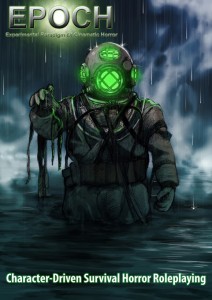 GM: Zed Lopez
GM: Zed Lopez
Players: Al Billings, Julie Southworth, Karen Twevles, and Sean Nittner
System: EPOCH
Warning: Spoilers. Road Trip is one of the scenarios that comes with Epoch and I’m going to talk about a few details in here. Not the whole story, but one of my contentions with the game reveals a plot point in the adventure.
EPOCH bills itself as a character-driven survival horror rolpeplaying game. That’s kind of a mouthful, but I think they meant every part of it.
Character-Driven
The Players Guide for the game has a “survival guide” section in it which I think they must have named ironically on purpose. The advice is to create drama, push your character’s secret into the open, and embrace conflict. Exactly the kind of things that would make for a good game, and not at all for your character actually surviving the scenario. At least not on the surface.
The mechanical reinforcement for this is a audience ballot after every conflict where all the of the players vote of the “most interesting character”. The implication here is that is you make an interesting character that is fun for everyone to play with, you get “up” voted, which rewards you mechanically with more chances to actually survive the scenario.
My initial reaction to this mechanic was to recoil from it. I dislike voting for “best roleplayer” in any scenario. I don’t want people to play for a reward or to turn a collaborative game into a competitive one. I do enjoy fan mail mechanics were you can vote for players in the moment of something being awesome, but I dislike the moment of “Okay, lets all rank who is the best player at the table”.
In practice and in review, my judgement stays the same as it was initially. The reality TV show model of voting people off the island (or in this case voting them under the butcher’s block) is decidedly unfun for me. The gamist in me says that as players we should all vote not based on who was the best roleplayer, but instead of who is the lowest in cards (the reward for winning a vote) so as to keep everyone in the game the longest. The narrativist in me doesn’t want to try and impress people with my roleplaying, I just want to do what is convincing to me in the narrative. The simulationist in me dislikes the illusionism of the the person who happens to survive is the one that we decided should survive because it’s good for the plot.
Survival Horror
In this element EPOCH really delivers, though the mechanism that ensures it works, also robs characters of agency. Here’s where I’ll get spoiler-y.
Mechanically speaking, each player has a fixed deck of cards that you play from during each challenge. The cards indicate how physically or mentally scarred you were by the challenge. If you can’t play a card, you die in the challenge. There are three injury cards (Light, Moderate, Severe I think). There is also one “Hero/Zero” card which allows you to either sacrifice yourself (hero) by playing two cards this turn and preventing another player from having to play a card, or endanger someone else (zero) by forcing them to play two cards this turn.
After the cards are played, everyone votes on their favorite character, and the winner gets to pick up one card from the discarded pile, thus ensuring they will survive one more encounter.
Mathematically speaking, the Hero/Zero cards on average cancel each other out (they either force the person playing them to play to cards, or another player to play two cards). So, assuming everyone plays their cards evenly, each character will survive three challenges plus one per round they “win”. Of course players will vary this up, so the likely outcome is that someone will run out of cards first and thus starts the chain of death. Mechanically speaking, it’s also almost impossible for everyone to die, because of the card currency.
From a horror movie emulation perspective, I think this works very well. It fixes character death as likely, and allows players to tip the balance somewhat one direction or another. This is where the reality TV show elimination model has mechanical teeth. If the the other players like your performance, you’re likely to live. There is a Flashback mechanic as well to try and help players make their characters more interesting, but mechanically speaking, all that does is allow those who didn’t win a vote more screen time to try and impress their fellow players.
The mechanic is very transparent in play though, so there isn’t a sense of “will we make it” dread, it’s more a sense of “I’ve got to be the one most liked if I want to survive”.
It also makes it very clear that the game is scripted. For example, in the scenario we played my character was looking for a basement in the building. We knew there was a radiator so their had to be a basement underneath it. There is no resolution system in the game besides challenges (which you only survive, you don’t overcome) and this wasn’t one of them, so I just didn’t find it. Later we were told to go into the basement and a hidden trap door was revealed.
Pretty much from that point on I realized we didn’t have agency in the game. The character-driven part of the game was character-attention-getting, and that our choices in the game amounted to mad libs of “inert way in which your character suffers here”.
Thoughts on the game
EPOCH did two things very well:
- It delivered a complete horror story in two hours.
- It mechanized the meet grinder effect of survival horror guaranteeing that all our characters would be horribly scarred by the experience, and that most wouldn’t make it (we had 1 survivor out of 4, but if we had play the cards a bit smarter could have had 2).
EPOCH was counter to my tastes in three ways:
- The narrative was not character driven at all. It was completely scripted and our characters were just called upon to react to the horror. The only decisions points were deciding how the horror maimed us.
- Player voting for “most interesting character” is counter to my ascetic that we’re all here to have a good time together because it creates a popularity contest at the table.
- While the survival was precise, it was obviously so. Where as Dread used a similar mechanic that visibly (and viscerally) demonstrates the danger, you never know exactly when the tower is going to fall. Maybe you can get just one more pull. Because there is no random elements in the game, and because four cards are very easy to count, who will die and when they will die is very easy to predict.
So far all I’ve really talked about was the game system. It stood out to me as particularly efficient in some regard and egregious in others. I don’t want to forget about the people at the table though:
Zed was very forthright running the game which I liked a lot. He established a social contract very early on asking us to stay in character and not break the tension when we were in a tension scene, and then told us we were welcome to make jokes, use the rest room, talk out out of character, and generally act casually when we were in a challenge scene. Throughout the game he made it very clear which scene type we were in and asked us to act accordingly.
I’m not sure how much he read the scenario or how many details were in it, but Zed also did a great job presenting a horror setting, which is quite a challenge. It’s easy to be either too direct, in which case horror becomes banal, or two mysterious in which case the horror doesn’t feel threatening till the very end. We were sufficiently lost, confused, and freaked out through most of the game. Some was our active suspension of disbelief, some was Zed’s creepy depictions.
Al, Julie, and Karen are all a bunch of fun to play with. Great characters full of banter, insecurities, and strong opinions. They all got my “vote”.

